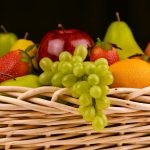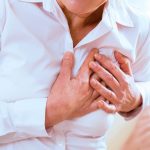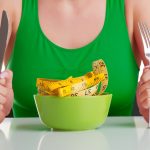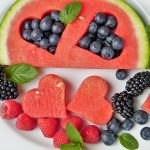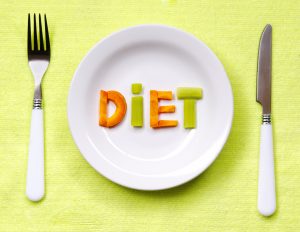 It is not a secret that we are what we eat. The healthy nutrition plays a significant role in each person’s life. However, if you have any diseases, there is a possibility that your daily ration must be checked out in order to fill your organism with maximum useful vitamins taking into account your health condition.
It is not a secret that we are what we eat. The healthy nutrition plays a significant role in each person’s life. However, if you have any diseases, there is a possibility that your daily ration must be checked out in order to fill your organism with maximum useful vitamins taking into account your health condition.
Diet is one of the important methods of treatment for many diseases. With such diseases as diabetes, for example, in the mild form, it is the most effective method. With therapeutic nutrition, it is important not only to correctly select products, but also to observe the culinary processing technology, the temperature of the food consumed by the patient, the multiplicity and time of food intake.
Contents
- Health problem number 1: Inflammation of the intestine and other intestine diseases
- Health problem number 2: Liver diseases
- Health problem number 3: Arthritis and other joint diseases
- Health problem number 4: Kidney diseases
- Health problem number 5: Cardiovascular diseases
- Video
Health problem number 1: Inflammation of the intestine and other intestine diseases
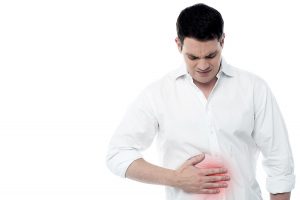 Every person sometimes has problems with the intestine. What are the intestinal diseases?
Every person sometimes has problems with the intestine. What are the intestinal diseases?
The intestine performs one of the main functions in the digestive process. Diseases of the intestine arise due to the dysentery, infection by the simplest microorganisms (lamblia, amoeba, trichomonads), intoxications (mercury, arsenic), violations of the regime and quality of nutrition, following inadequate diets, traumas. Diseases of the intestine are divided into acute and chronic. It is necessary to treat the diseases of the intestines in a timely and correct way, in order to avoid the overflow of the disease into the chronic form.
The main role in the treatment of diseases of the intestine, in addition to drug therapy, belongs to the proper diet therapy. Diet depends on the nature of the disease, the state of motor function of the intestine, the presence or absence of food intolerance, age, sex of the patient, concomitant diseases.
· Nutrition if you have acute inflammation of the intestine (enterocolitis):
In case of acute inflammation, it is recommended to have only liquid foods for the first days, for example, rice broth and blueberry jelly. When vomiting and diarrhea, the body loses a lot of fluid, it is very important to drink more fluid. It is recommended to drink hot tea without sugar or mineral water. On the third day of the disease, a diet with a limited amount of calories is recommended: 200 g of carbohydrates, 60 g of fats, 5-6 g of table salt, 100-120 g proteins.
· Nutrition if you have severe diarrhea
Recommended foods:
- soups with lean broth from fish or meat, you can add rice or a mango;
- vegetable broth;
- rusks from wheat bread;
- steamed cutlets from low-fat meat or fish;
- low-fat cottage cheese;
- porridge (buckwheat, oatmeal, rice);
- jelly;
- green tea;
- black coffee;
- broth from black currant, dried blueberries.
NOT Recommended foods:
- fatty foods and products (broths, meat, poultry, fish);
- canned food, smoked products;
- flour and bakery products;
- dairy;
- pearl and wheat rump;
- pasta;
- beans;
- berries, vegetables, fruits in fresh form;
- cakes, sweets, chocolate;
- coffee, cocoa;
- cold and carbonated drinks
The food is characterized by low energy value (2000kcal per day). A day consumed protein should be 90 g, fat 70 g, carbohydrate 250 g.
Nutrition for Constipation Relief:
Recommended products:
- vegetable soups;
- meat, fish (low-fat);
- stale bread from wholemeal flour;
- dairy products;
- crumbly porridge;
- vegetables (carrots, tomatoes, beets, zucchini, cucumbers, cauliflower, pumpkin);
- berries and fruits;
- honey, jam;
- soaked dried fruits (figs, prunes);
- broth of wild rose;
- juices (vegetable, fruit)
NOT Recommended Foods:
- fat meat;
- bakery products;
- beans;
- garlic, onion;
- radish;
- canned food, smoked products;
- rice, semolina;
- pasta;
- chocolate;
- strong tea;
- mustard, pepper, horseradish.
Important: Energy value of nutrition for constipation 2800-3000 kcal per day, and also proteins 100g (50g animal proteins), fats 90-130g (50g vegetable fats), carbohydrates 400-420g.
Health problem number 2: Liver diseases
![peresadka-pecheni-v-izraile[1]](https://howfacecare.com/wp-content/uploads/2017/12/peresadka-pecheni-v-izraile1-300x195.jpg) The liver is a natural filter in the body. If it is overloaded, it becomes stops functioning normally. It is easy to imagine what a huge load in such conditions lies on the liver, which seeks to neutralize all harmful substances entering the body from the environment. Often, the liver is simply unable to cope with such a massive blow. In addition, uncontrolled intake of medications, constant stress, depression, not even mentioning bad habits, lack of sleep and malnutrition, adversely affect the protective functions of the body and worsen the liver condition.
The liver is a natural filter in the body. If it is overloaded, it becomes stops functioning normally. It is easy to imagine what a huge load in such conditions lies on the liver, which seeks to neutralize all harmful substances entering the body from the environment. Often, the liver is simply unable to cope with such a massive blow. In addition, uncontrolled intake of medications, constant stress, depression, not even mentioning bad habits, lack of sleep and malnutrition, adversely affect the protective functions of the body and worsen the liver condition.
Recommended:
- Cereals in the form of cereals (not strongly boiled);
- Pasta should be consumed in limited quantities;
- Dairy and sour-milk products (low-fat cottage cheese, low-fat sour cream, fermented milk, milk, kefir, yogurt, etc.);
- Low-fat varieties of meat (veal, beef, turkey, chicken, rabbit, etc.);
- River and sea fish;
- Eggs, in the form of an omelet or in the composition of other dishes (chicken and quail);
- Vegetables and greens (should limit the amount of legumes and those vegetables that contain coarse fiber);
- Fruit (do not eat pear);
- Honey (it is an excellent substitute for sugar, but it should be consumed in limited quantities), etc.
- fill the prepared dishes with vegetable oils.
Despite the fact that during treatment patients should limit the amount of sugar, gastroenterologists allow them some sweets:
- Mousses (cooked from berries or fruits);
- Marshmallow;
- Pastila;
- Souffle;
- Jelly;
- Marmalade;
- Jam;
- Oat cookies.
When passing any course of treatment, it is important for patients to maintain a normal water balance in the body. Preference should be given to the following drinks:
- Compotes from berries and dried fruits;
- Not strong tea;
- Natural vegetable and fruit and berry juices;
- Pure water.
NOT Recommended:
In case of problems with the liver, it is strictly forbidden to eat smoked, sharp, fatty and fried foods that can provoke an exacerbation of the disease.
Gastroenterologists forbid their patients to use the following products during the course of treatment:
- Mushrooms;
- Fatty grades of meat (pork, lamb, etc.);
- Some varieties of poultry (especially it is not recommended to eat meat of waterfowl – ducks, geese, etc.);
- Fat;
- Broths (mushroom and meat);
- Cheeses, especially fatty varieties;
- Fatty cottage cheese;
- Butter, margarine and culinary fat;
- Fatty fish;
- Canned food (fish, meat, etc.);
- Smoked products (sausages, etc.);
- Seasonings (pepper, vinegar, mustard, etc.);
- Some vegetables and herbs (radish, sorrel, radish, green and onion, garlic);
- Fresh pastries, as well as rye bread;
- Ice cream;
- Candies and chocolate;
- Any confectionery, which includes fat cream;
- Alcohol and alcohol-containing drinks;
- Coffee and coffee drinks;
- Sweet and carbonated drinks;
- Strong tea;
- Sour fruit juices;
- Cocoa;
- Nuts;
- Bread (with some diseases it is allowed to use stale, or white bread dried in the oven).
Important: When preparing the first dishes, patients with liver disease should use either pure water or vegetable broth. In this case, do not forget about milk soups, which are very easy to digest and for a long time keep you feeling full.
Health problem number 3: Arthritis and other joint diseases
![Obat-Nyeri-Sendi[1]](https://howfacecare.com/wp-content/uploads/2017/12/Obat-Nyeri-Sendi1-300x201.jpg) There are eight most useful foods that contain the maximum amount of useful substances that will help the inflamed joint to return to normal.
There are eight most useful foods that contain the maximum amount of useful substances that will help the inflamed joint to return to normal.
Recommended foods:
- Salmon: This fish is a champion in the content of omega-3 acids. They are necessary for the joints in order to remove inflammation.
- Almond: it contains a lot of vitamin E. Its regular intake into the body contributes to the fact that the outer membrane of the articular bags will be strengthened. This will protect the joint from destruction by free radicals.
- Papaya: Its advantage lies in the fact that it contains just a huge amount of vitamin C. According to the latest research, it influences both the occurrence and the rate of development of arthritis. It is in vain to believe that this vitamin is abundant in oranges and lemons, in papaya it is twice as large. In addition, this exotic fruit contains beta-carotene, which is useful for joint health.
- Apples: Contributes to the production of collagen, which is the basis of the cartilaginous tissue of the joint, which is destroyed by arthritis. Naturally, there is no collagen in apples, but they contain quercetin, which actively participates in its formation.
- Black beans: Contain more antioxidants, especially those struggling with free radical anthocyanins, which inhibit the production of cyclooxygenase (cox-2), the enzyme responsible for inflammation. Also, black beans are filled with manganese, an indispensable mineral for the health of joints.
- Cabbage leaves: This product is rich in calcium, which is necessary for bones.
- Broccoli: It is a close relative of leafy cabbage. They are especially useful for older people. The level of sulforaphane (a component responsible for combating radicals that destroy cartilage and bone tissue) in the blood of which is low. In addition, eating broccoli, a person saturates the body with calcium, vitamins A and C.
- Ginger: It will remove puffiness and pain.
NOT Recommended foods:
- Strong tea and coffee: Provokes the development of arthritis and aggravates its course.
- Meat dishes: Getting into the human body, it breaks down into eicosanoids. It is these biologically active substances that cause inflammation of the joints, which leads to arthritis.
- Alcohol: The use of alcoholic drinks leads to the fact that active substances such as adrenaline and dopamine come into the human blood. They, aggravate the course of the disease, increasing inflammation in the tissues of the joint. At the same time the level of potassium in the blood decreases, which leads to the formation of edema.
- Chocolate: Contains concentrated sugar, which will contribute to the accumulation of excess weight. This will negatively affect the condition of the joints, contributing to their deformation.
- Salt: These white crystals lead to the deposition of salts in the joints, contribute to a decrease in bone mass, increase edema, the development of inflammation and increased pain.
- French fries, chips, crackers, margarine, cakes: All these products contain trans fats, which will lead to an increase in body weight, will contribute to the violation of blood circulation, which means that joints will lose nutrients, which will aggravate the course of arthritis.
Important: Yolk eggs, butter, cod liver, eggplant tomatoes, sour cream will contribute to the fact that there will be a risk of developing gout, and hence an attack of gouty arthritis.
Health problem number 4: Kidney diseases
![Dolor-en-la-zona-izquierda-de-la-espalda[1]](https://howfacecare.com/wp-content/uploads/2017/12/Dolor-en-la-zona-izquierda-de-la-espalda1-300x174.jpg) There is a special diet, which is prescribed for kidney diseases. Its aim is to sharply limit the content of extractives that irritate the kidneys, increase the excretion of unoxidized metabolic products from the body, and have an anti-inflammatory effect.
There is a special diet, which is prescribed for kidney diseases. Its aim is to sharply limit the content of extractives that irritate the kidneys, increase the excretion of unoxidized metabolic products from the body, and have an anti-inflammatory effect.
But do not forget that the diet for kidney disease should be diverse, vitaminized, containing proteins, fats and carbohydrates within reasonable limits. It is very important to eat food that has lipotropic properties (milk and sour-milk products). But it’s better to refrain from eating fatty sour cream.
Food can be seasoned with dried dill or cinnamon. You can add a small amount of wine vinegar. Consumption of salt per day should not exceed 5 g. At the same time, you should prepare food without salt, and salt only the already prepared dish. But if you have an acute form of inflammation, then salt should be excluded. The food should be divided – you need to divide the daily ration into 5-6 receptions.
Recommended foods:
- Diuretics: pumpkin, zucchini, cucumber, beetroot, deciduous salads, salads from raw vegetables, fresh fruits, raisins, apricots, dried apricots, prunes, fresh apricots, watermelon and melon.
- Bread and flour products – bread without protein, white wheat bran (baked without salt).
- Soups – mostly vegetarian with vegetables, cereals, pasta, are prepared without salt, dressed with butter, flavored with herbs, lemon.
- Meat and poultry are limited to the first 2 weeks of treatment. Subsequently, meat of low-fat varieties, boiled and fried.
- Fish of low-fat varieties in boiled and baked form.
- Eggs – 1-2 eggs a day in the form of protein omelets, soft.
- Milk and milk products – milk, sour-milk drinks, natural cottage cheese and in the form of casseroles, puddings. All in limited quantities.
- Vegetables and greens – potatoes, carrots, beets, cauliflower, lettuce, tomatoes, cucumbers, parsley, dill; boiled and in kind.
- Fruits and sweet dishes – fruits and berries boiled and in kind (especially recommended watermelon, melon); mashed potatoes, jellies, mousse on starch; sugar, honey, jam.
- Cereals and pasta are limited; are replaced by sago and special pasta.
- Snacks – mild cheese, veal, vegetable and fruit salads, jellied fish, vinaigrette with vegetable oil.
- Sauces – milk, sour cream, vegetable, fruit sweet infusions, with the exception of meat, mushroom and fish broths.
NOT Recommended foods:
- Carbonated drinks,
- Bread of ordinary baking, black bread.
- All the salty foods.
- Meat, fish and mushroom broths.
- Fatty grades of meat, fish, poultry; sausages, smoked products, meat and fish canned food, salted fish, cheeses.
- Canned food.
- Legumes, onions, garlic, sorrel, mushrooms; salted, pickled and pickled vegetables.
- Chocolate, strong coffee, cocoa.
- Alcohol.
- Mineral water, rich in sodium.
The main principle is that the amount of protein consumed should be reduced to 20-25 g per day. In this case, usually reduce the number of plant proteins. This is all sorts of legumes, cereals, flour products (bread, etc.), because of their biological value, these proteins are inferior to animal proteins, and overload the body with harmful products of protein metabolism.
Important: In the early stages of kidney disease, the diet is aimed at controlling the amount of protein and phosphorus consumed. In addition, sodium intake (which comes with sodium chloride) is monitored.
Health problem number 5: Cardiovascular diseases
![Screen-Shot-2015-08-02-at-9.40.26-AM[1]](https://howfacecare.com/wp-content/uploads/2017/12/Screen-Shot-2015-08-02-at-9.40.26-AM1-300x193.png) Cardiovascular diseases – and this, above all, ischemic heart disease and hypertension and their complications – are the main cause of death and disability in most countries of the world. These ailments, as well as associated with atherosclerosis, largely depend on your diet.
Cardiovascular diseases – and this, above all, ischemic heart disease and hypertension and their complications – are the main cause of death and disability in most countries of the world. These ailments, as well as associated with atherosclerosis, largely depend on your diet.
Products should be preferably used in fresh or boiled form, as well as – baked or cooked on steam.
Recommended foods:
- bread from the wholemeal flour;
- any kinds of greens, vegetables and fruits;
- lean varieties of meat and fish;
- seafood;
- eggs (in moderation);
- vegetarian soups and vegetable broths;
- macaroni and cereals;
- milk products;
- compotes and freshly squeezed juices;
- honey, nuts and dried fruits;
- vegetable oil
NOT Recommended:
- fatty meat and fish;
- animal fats (including butter and margarine);
- rich soups and broths;
- canned and marinated products;
- beans;
- sauerkraut;
- spicy and spicy dishes;
- fresh wheat bread;
- sugar and sweets;
- strong teas, coffee, cocoa and cocoa products;
- all kinds of alcoholic drinks.
Important: The proper nutrition of the patient with cardiovascular pathology should be not a temporary measure, but an obligatory and integral part of the everyday way of life.
